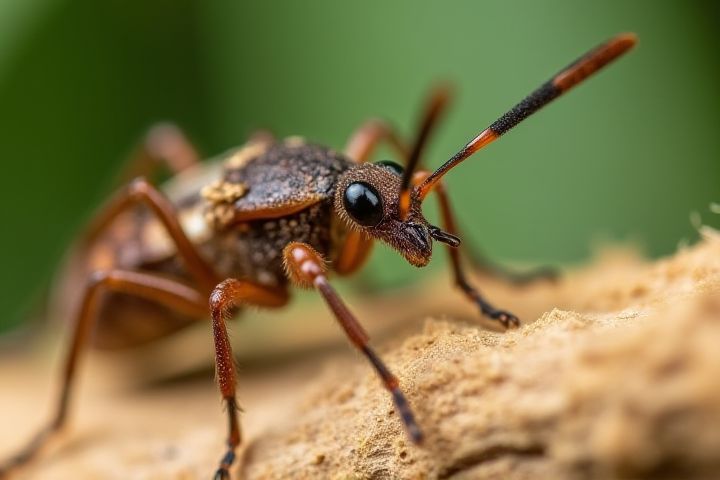
Effective pest management begins with identifying the type of pest invading your home, such as ants, rodents, or termites, allowing you to choose the right approach. Regularly sealing gaps in doors, windows, and foundations can prevent pests from entering, protecting your living space. Maintaining cleanliness by promptly handling food spills and properly storing food items is essential in deterring insects and rodents. Utilizing natural deterrents, like peppermint oil for ants or traps for rodents, provides safer alternatives to chemical pesticides. If infestations persist, consulting a professional pest control service can ensure thorough and long-term solutions tailored to your specific situation.
How To Manage House Pests
Identify the pest type accurately
To effectively manage house pests, begin by identifying the specific type of pest present in your home. Common household pests include ants, cockroaches, termites, and rodents, each with distinct characteristics and behaviors. Utilize pest identification guides or consult online resources to accurately pinpoint the pest, taking note of its size, color, and any damage it may have caused. Once you understand the pest type, you can implement targeted control measures, ensuring your approach effectively addresses the issue at hand.
Seal entry points and cracks
Seal entry points and cracks to effectively manage house pests and prevent their intrusion. Focus on potential access areas such as windows, doors, and gaps in the foundation, using materials like caulk, steel wool, or expanding foam. Regular inspections can help identify new entry points, ensuring you address them promptly. By sealing these vulnerabilities, you can reduce pest populations in your home by up to 80%.
Keep kitchen and home clean
Maintaining a clean kitchen and home is essential in managing house pests, as it eliminates food sources that attract them. Regularly wipe down countertops, sweep and vacuum floors, and ensure that all food is stored in sealed containers. Garbage bins should be emptied frequently and cleaned to prevent odors that can lure pests, while immediate spills and crumbs should be addressed to minimize access to sustenance. Ultimately, implementing these cleanliness habits creates an unwelcoming environment for pests, making it easier for you to maintain a pest-free home.
Store food in airtight containers
Storing food in airtight containers significantly reduces the risk of attracting house pests, such as ants and rodents. By sealing your food tightly, you prevent moisture and odors from escaping, which can lure these unwanted visitors. Choose high-quality containers made from glass or BPA-free plastic, ensuring they have secure lids that maintain an airtight seal. This simple yet effective strategy can protect your home from infestations and prolong the shelf life of your groceries.
Use natural repellents like essential oils
Managing house pests effectively can often be achieved by utilizing natural repellents such as essential oils. Oils like peppermint, lavender, and tea tree are known for their insect-repelling properties and can deter pests without the use of harmful chemicals. To create an effective spray, mix 10-15 drops of your chosen essential oil with water in a spray bottle and apply it to areas where pests commonly invade. Regularly reapply this solution every few days or after cleaning to maintain its effectiveness and keep your home pest-free.
Regularly dispose of garbage
Regularly disposing of garbage is crucial in managing house pests effectively, as 30% of common household pests are attracted to food waste. Implement a routine to take out the trash at least once a week, ensuring all garbage is securely sealed in pest-proof containers. This simple action can reduce pest sightings by up to 50%, protecting your home from infestations. Keeping your garbage area clean and free of spills will deter pests while promoting a healthier living environment.
Fix leaky pipes and faucets
Fixing leaky pipes and faucets is crucial in managing house pests, as stagnant water attracts various insects and rodents. Regularly inspect your plumbing for leaks, paying special attention to under sinks and around toilets, to maintain a dry environment. For minor leaks, utilize plumber's tape to seal joints temporarily, but consider calling a professional if the problem persists or worsens. Keeping your home water-tight can significantly reduce pest attraction and improve your overall quality of living.
Trim shrubs and plants away from the house
Trimming shrubs and plants away from your house is a crucial step in managing house pests effectively. Maintaining a clearance of at least 12 to 18 inches between vegetation and your home reduces potential nesting sites for pests and minimizes their access. Regularly pruning overgrown plants and eliminating dead debris can deter unwanted insects and rodents that may seek shelter close to your home. You can significantly decrease the likelihood of infestations by keeping the landscape tidy and well-maintained.
Employ traps and bait stations
Employing traps and bait stations is an effective strategy for managing house pests. Traps can capture rodents and insects, providing a visible means of monitoring infestations, while bait stations attract pests to consume poison-laced bait. Choose specific traps for various pests; for instance, snap traps are ideal for mice, while glue traps can help with insect issues. Ensure to place these traps in high-traffic areas and regularly check them, as this minimizes the risk of pests spreading throughout your home.
Consider professional pest control services
Considering professional pest control services can be a strategic move for effective pest management in your home. These experts utilize industry-standard techniques and eco-friendly products to eliminate infestations, ensuring your living space remains safe and healthy. Typically, a thorough inspection precedes treatment, allowing technicians to identify specific pest species and their entry points, which can lead to a tailored action plan. Investing in professional services can also save you time and money in the long run, as a single treatment can often address persistent issues that DIY methods may fail to resolve.
